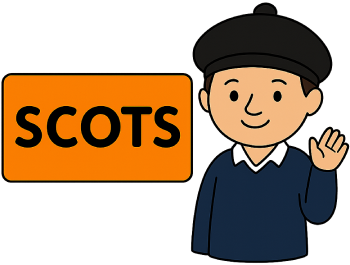Scots, the Germanic language of the Scottish Lowlands, traces its ancestry to Old English. Specifically, it descended from the Old Northumbrian dialect, making it closely related to the northern English dialects of England. Over time, however, Scots evolved independently, developing unique vocabulary, phonology, and grammatical structures, which now justify its recognition as a language in its own right rather than merely a dialect of English.

Historically, Scots was the language of administration, literature, and daily communication in Scotland until the country fell under English political influence. One of the most famous cultural products of Scots is the song Auld Lang Syne, penned by the renowned poet Robert Burns (Rabbie Burns), which continues to be sung globally as a symbol of Scottish heritage.
Scots is not a monolithic language; it consists of several dialect groups, each with its own distinct characteristics. The three primary groups are:
The Mainland Scots group includes a variety of regional dialects, each with its own historical and phonological traits:
While some perceive Scots as a variant or “slang” form of English, it is important to recognize that Scots possesses its own long-standing traditions, norms, and literary heritage. Unlike Scottish English, Scots has preserved distinctive vocabulary, idioms, and phonetic patterns over centuries. Today, Scots is officially recognized as one of Scotland’s languages, alongside English and Gaelic, reflecting its cultural and historical significance.
Scots originated from Old Northumbrian, a branch of Old Anglish used by the Germanic Angles, who migrated to Britain along with Saxons, Jutes, and Frisians. In early Scotland, the language was often called Inglis, meaning “Anglish” or “English,” but even then it was considered distinct from the ancestor of modern English in southern England. Its northern English roots mean that modern Scots shares many similarities with the Northumbrian dialects still spoken in northeastern England, though Scots evolved independently into a fully separate language.
For centuries, Scots has been a medium for poetry, folklore, and official documents. Works in Scots include legal texts, religious manuscripts, and creative literature, which collectively illustrate the language’s richness and diversity. Literary Scots, particularly the writings of Robert Burns, have left an indelible mark on global culture and continue to be celebrated for their unique phonetic rhythm and expressive vocabulary.
Today, Scots remains spoken primarily in the Lowlands, with Shetlandic and Ulster Scots communities maintaining their own regional forms. Education, media, and literature have helped preserve the language, although English remains dominant in public life. Efforts continue to promote Scots in schools, local broadcasting, and cultural events, ensuring that it remains a living language for future generations.
All languages and dialects are valuable cultural treasures. Scots is no exception, offering a window into Scotland’s history, identity, and rich literary traditions. By appreciating and preserving Scots, speakers and enthusiasts can celebrate one of the world’s unique linguistic heritages.
Don't worry, we won't spam you with emails.